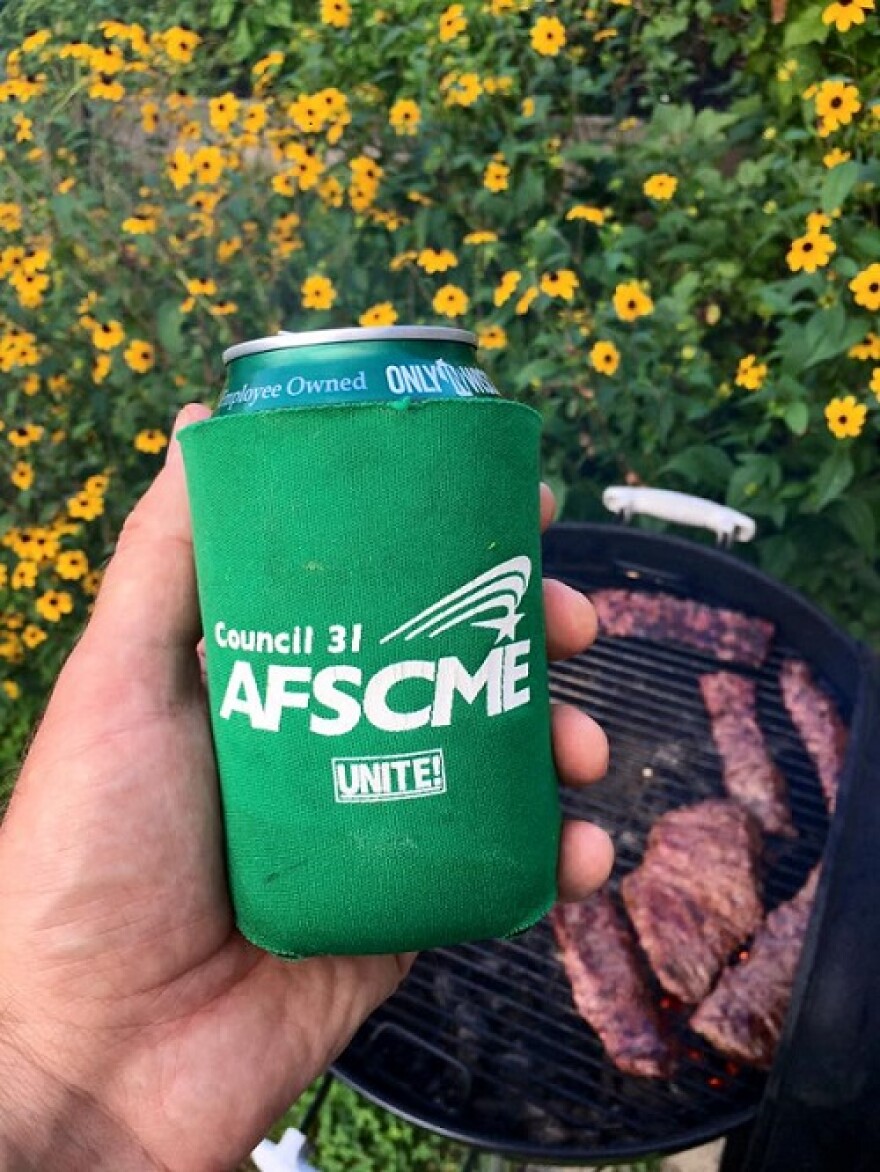Some unionized workers who felt left behind by economic changes voted for Donald Trump. In Illinois, Gov. Bruce Rauner just vetoed a minimum wage law. Despite that, the head of the Bloomington-Normal Trades and Labor Assembly says the state of labor is better than some might think.
Speaking a few days before Bloomington's union-themed Labor Day parade, Mike Matejka says Illinois is fairing better than some other Midwestern states when it comes to keeping unions strong.
"Thanks to (Illinois House Speaker) Mike Madigan, Bruce Rauner was not able to destroy unions like his Republican counterparts in Indiana, Wisconsin, Michigan and Missouri have done in the last two years. He's been able to uphold people's rights in this state," he said.
Matejka says Rauner's "Turnaround Agenda" attempted to erode people's rights by taking away wages and taking away rights to organize.
"He has not been successful in doing that," he said.
But Matejka says the governor has succeeded in using his veto power and his control over the Illinois Department of Labor to ignore enforcement of labor laws.
Unions Continue to Battle Rauner

Laborers have successfully sued the Illinois Department of Labor for not enforcing a requirement to set and enforce a prevailing wage which is tied to union rates for state-supported construction projects.
"Even though he (Rauner) has not been able to change law legislatively, lack of enforcement can make a real difference for people in a negative way," Matejka said.
The state budget impasse has also left many construction workers on the sidelines because there has been little to no money allocated for infrastructure, he said.
The state's largest union representing state workers has been without a contract since the governor took office. The American Federation of State, County and Municipal Employees (AFSCME) union is appealing a state labor board decision that negotiations are at an impasse. In the meantime, the Fourth District Appellate Court has prevented terms of the governor's last and final offer from taking effect because justices said the union has a good chance of wining its appeal.
Fight for $15 Movement
Rauner said he was doing right by employees in Illinois by vetoing a bill that would bring the state's minimum wage to $15 per hour by 2020.
"Mainstream economic theory and mainstream economic evidence strongly suggest that an increase in the minimum wage of this magnitude will hurt the very individuals it seeks to help," Rauner said.
Matejka discounts Rauner's position, even though the governor cited a University of Washington study of employees in Seattle that showed once a minimum wage was increased, workers' hours were cut and they lost, on average, $125 a month.
"There are all kinds of studies around those issues," Matejka said. "There was a similar academic study in New Jersey that found when minimum wages went up, there was no detrimental impact on employment."
Trickle Down Versus Bubble Up
Matejka says today's trickle down economy is not helping average workers. He admits it's tricky to find the right balance in minimum wage legislation so smaller employers are not put out of business.
"What's that magic formula? It's probably different for a small business with two or three employees than it is for Walmart or a large employer that has thousands of people who are dependent on public assistance to make a living."

Trump and Unions
While major unions backed Democrat Hillary Clinton in the presidential election, many individual members voted for Trump based on his promises of revoking trade deals and bringing jobs back to manufacturing sectors. But Matejka says while trade is important, there are other factors that will impact the economy in a big way.
"Automation is taking as many jobs as trade is, and at the same time people do have legitimate concerns about trade issues and sometimes the Democrats have been weak in terms of addressing trade issues and making sure people are protected in the process," Matejka lamented.
He says current federal legislation also needs to be revamped to do away with incentives to move jobs overseas.
"There are a lot of tax programs and other things that give subsidy to send jobs overseas. So how do we do that in a way that protects American jobs but also gives people equal opportunity with countries that may not be enforcing environmental law, labor laws and right to organize laws that we have in this country?"
But, there is some good news for union members to tout as they march in their Labor Day parades. More people are supportive of unions than they have been since approval hit an all-time low in 2009, according to a new Gallop Poll. Sixty-one percent of adults say they support labor unions. Another study found half of non-unionized workers said if a vote was held in their workplace today, they would support unionizing.
Yet, union membership is dropping nationwide. Why? Matejka says people don't understand their rights.
"They don't know they have a right to stand up for themselves and to build an organization that works for them." He adds federal laws don't make it easy to unionize.
Companies are not restricted in how they message employees about organizing. Matejka says manufacturers can intimidate workers.
"It's not uncommon in a factory situation that all of a sudden machines get slapped with stickers on them that say 'prepare to move this machine to Mexico' which may or may not be true but it's a way to frighten people against union representation," Matejka said.
You can also listen to GLT's full interview with Matejka:
WGLT depends on financial support from users to bring you stories and interviews like this one. As someone who values experienced, knowledgeable, and award-winning journalists covering meaningful stories in central Illinois, please consider making a contribution.




